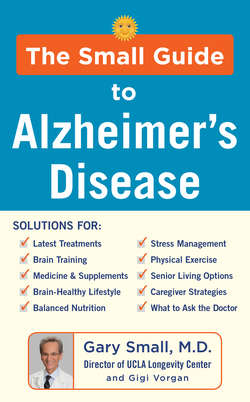Читать книгу The Small Guide to Alzheimer's Disease - Gary Small - Страница 13
На сайте Литреса книга снята с продажи.
Chapter 2 Seeing the Doctor
ОглавлениеI become faint and nauseous during even very minor medical procedures, such as making an appointment by phone.
—Dave Barry
My office door was closed, but I could still hear my new patient, George, arguing with his wife, Karen, in the waiting room. Both in their late 60s, they had been referred to me by their family doctor because of George’s memory problems. I opened the door and asked them to come in. Karen marched in first, angry, and sat on the edge of the couch. George sat beside her and remained silent.
“How can I be of help?” I asked.
“I’m worried about George’s memory,” Karen said. “He’s forgetting things right and left, and he seems spaced out half the time. It reminds me of when my stepfather came down with Alzheimer’s disease. He needs help.”
I looked to George and asked, “What has it been like for you?”
He shrugged and said, “It’s not just me. Everyone I know is becoming forgetful. Even you, Karen.”
Karen rolled her eyes. “You see, he’s in complete denial. I don’t know what to do. It reminds me of my stepfather.”
George reached out to comfort her, but Karen moved her arm away.
I said, “I’d like to ask you both some questions and put together a history—”
“Why ask me questions?” Karen snapped. “George is the one with the problem.”
George shrugged, and I said, “That’s fine, Karen. Perhaps you could step back into the waiting room while I speak with George?”
Karen said, “I’ll wait outside.”
Once we were alone, George seemed to relax.
“Look, Dr. Small, it’s not me, it’s Karen who has the problem.”
“Oh?”
“Sure, I’m a little forgetful like everyone else I know, but Karen has real memory issues and refuses to admit it.”
“When did you start noticing this?”
“She’s been gradually losing it for almost two years now. She repeats herself constantly, forgets people’s names, and can’t find things she just put down. Whenever I try to bring it up, she gets mad and says it’s me who has the problem. I don’t know what to do.”
“So you’re saying she is the one in denial?”
“Absolutely. There’s no way she would have come with me to see you today if I hadn’t said the appointment was for me.”
Like Karen, many people in the early stages of cognitive decline are unwilling to face the reality of what it may mean. Fear of memory loss as we age is almost universal because memory is so important to our independence and sense of self. Karen didn’t want to accept that her memory was getting worse because she worried that she was developing Alzheimer’s like her stepfather did. She felt shame about her increasing forgetfulness and feared that she might eventually become dependent on others for her daily needs. Denial is a common psychological defense mechanism that people use to protect themselves from such uncomfortable feelings but can also delay their discovering what’s causing their problem and getting proper treatment. However, it is clearly easier to protect a healthy brain than to try to repair damage once it becomes extensive. Even if someone is suffering from Alzheimer’s dementia, research shows that patients who get into treatment early have better outcomes.
And it’s not just the patients who slow down the diagnostic and treatment process. Doctors and other healthcare providers often overlook memory problems and other mental symptoms during routine exams. Many healthcare systems and insurance carriers provide disincentives for doctors to care for dementia patients. The time allowed for visits is limited, as are the reimbursements for dementia care. As a result of pushback from patients, families, and the health system, it is estimated that at least half of all patients suffering from Alzheimer’s dementia are walking around with it and don’t know it.
Although George was not honest with Karen about the reason for their appointment, his ruse worked out for the best. They returned together a week later, and I focused mainly on strategies to improve George’s mild, age-related memory slips. Karen got to know me better, felt less defensive about her memory problems, and became more willing to pursue help for herself. She was able to open up about her fading memory, and she finally agreed to let me focus on her issues.
Karen, like many of her peers, used denial to convince herself that her fading memory abilities were a normal part of aging. After all, her friends were all forgetting where they put their keys and glasses too.
Anyone who is living with a family member suffering from Alzheimer’s disease knows how patients tend to minimize their symptoms and even hide them from others. This often occurs early in the course of the disease, when patients are aware of the implications of their fading memory abilities but not yet afraid enough to speak up.
